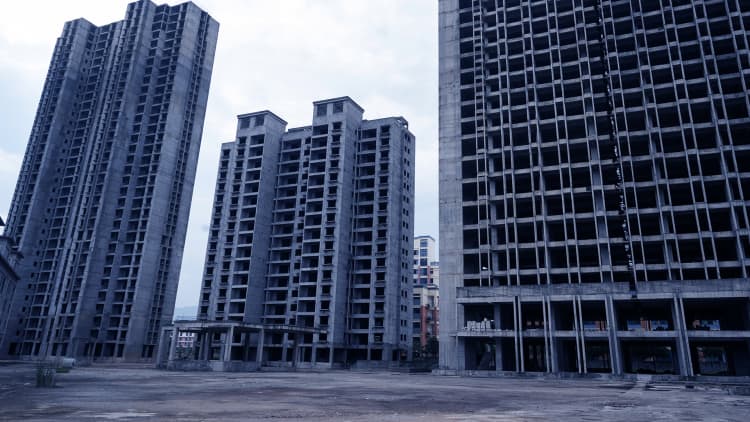A real estate construction site in Wanxiang Town, Huai'an City, east China's Jiangsu Province, May 17, 2024.
Future Publishing | Future Publishing | Getty Images
BEIJING – China's sweeping moves on Friday to increase support for the real estate sector will take time to show results, analysts said.
Despite the news, S&P is still sticking to its base case from earlier in the month that China's real estate market is likely still “looking for the bottom,” Edward Chan, director of corporate ratings, said during the company's webinar on Monday.
He said, “The importance of presenting the policy last Friday is that the government is presenting all of these policies at once, on the same day, and at one time.” “This shows that the government is serious and committed to achieving stability in the real estate sector.”
But he noted that for real estate to stabilize significantly, homebuyer demand and confidence will need to improve after the market has been down for about three years.
Hong Kong-listed property shares rose late last week, but were little changed on Monday, according to an industry index from financial database Wind Information.
On Friday, Chinese authorities reduced the minimum down payment to 15%, compared to 20% previously, in addition to eliminating minimum mortgage rates nationwide.
Policymakers also sought to boost developers' liquidity by releasing 300 billion yuan (US$42.25 billion) in financing for local state-owned enterprises to purchase unsold completed apartments in order to turn them into affordable housing.
We believe that Beijing is moving in the right direction in terms of ending the housing crisis.
Ting Lu
Chief China Economist, Nomura
“Although some of these measures are unprecedented (for example, the minimum down payment requirement was previously no lower than 20%), they are still insufficient compared to our real estate team’s estimate of at least CNY 1 trillion in funding to start absorbing Excess inventory and allowing new home prices to “find a bottom within a year,” Hui Shan, chief China economist at Goldman Sachs, said in a note on Sunday.
“We believe Beijing is moving in the right direction in terms of ending the epic housing crisis,” Ting Lu, chief China economist at Nomura Bank, said in a report on Monday.
“Beijing has already shifted from building public housing to ensuring the delivery of many pre-sold homes to rebuild buyer confidence, marking an important step towards cleaning up the big mess.”
“However, this has proven to be a daunting task, and we believe markets need to be more patient when waiting for more stringent measures,” he added.
Official data released on Friday showed that real estate investment fell at a steeper pace in April than in March, with the sale of new commercial space for the first four months of the year down 20.2% from a year ago. The data also showed that retail sales grew less than expected in April.
The majority of household wealth is concentrated in real estate, while uncertainty about future income has affected consumer spending.
Rebuild home buyer confidence
Standard & Poor's Chan said homebuyers' confidence depends in part on their economic outlook and whether they can get apartments they paid for but don't yet get.
Apartments in China are usually sold before construction. But in recent years, financing problems faced by property developers and other issues have lengthened delivery times – with some buyers waiting several years.


“If there is stability in house prices, I think there will be more home buyers willing to enter the market,” Chan said. He pointed out that since buying an apartment is a big investment for most people, they “don't want to see their capital diminished.”
The official index of home prices for 70 cities released on Friday fell more quickly in April than in March, according to a Goldman Sachs analysis that looks at a seasonally adjusted annual weighted average.
Home prices in China have fallen 25% to 30% on average from historic highs in 2020 and 2021, Nomura's Lu estimated.
It is also estimated that there are still about 20 million pre-sold apartments yet to be completed, representing a financing gap of about 3 trillion yuan ($414.58 billion).
Lu expects that in the next few months, Beijing is likely to conduct a national survey of housing projects to estimate the amount of money needed to finish construction and deliver the homes.
“In our view, rebuilding homebuyers' confidence in the pre-sale system is a prerequisite for a real revival of China's housing markets,” he said.
